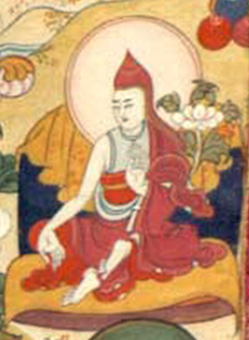Kyergangpa Chökyi Senge: Difference between revisions
SherabDrime (talk | contribs) mNo edit summary |
SherabDrime (talk | contribs) mNo edit summary |
||
| Line 1: | Line 1: | ||
[[Image:Kyergangpa.jpg|frame|Kyergangpa Chökyi Senge (1143-1216) ]] | |||
adapted from "Shangpa Masters" on [http://www.paldenshangpa.org/ShangpaMasters.html] | adapted from "Shangpa Masters" on [http://www.paldenshangpa.org/ShangpaMasters.html] | ||
Revision as of 00:55, 29 January 2012
adapted from "Shangpa Masters" on [1]
Kyergangpa Chökyi Senge (1143-1216) was born to the Ba family in the upper reaches of Nang County. He studied and practiced intensely during his teenage years. At the age of sixteen he joined the retinue of his uncle Thamche Khyenpa who was proceeding to Draklha. He received the complete Avalokiteshvara teachings from a great practitioner of Avalokiteshvara, Pakpa Chegom. Through practicing in solitary retreat for four and half years Kyergangpa received a vision of Avalokiteshvara. Through his teacher Tsari Gompa in Lato, he received the complete instructions of Rechungpa. Kyergangpa spent five years with Lama Penpukpa Chenpo and receive all the practices and instructions of lord Atisha. From Mokchokpa, the great adept at Lhabu in Shang, he mastered the teachings on Clear Light, Dream Yoga, and Illusory Form and had uninterrupted vision of many deities. While Kyerganpa practising diligently, he was informed that his uncle Ba Thamche Khyenpa had passed away. According to the advice of his Lama, Mokchokpa Rinchen Tsondrü, and the request of the people of Kyergang, he took over the monastery of his uncle, reconstructed it and established the Shangpa lineage there. His precious lama died several years later. Kyergangpa had many students and lamas in Shang who had visions of Avalokiteshvara. Among his disciples Nakpo Zhontrul, Drakpa Yeshi and Rigongpa Chökyi Sherab were the best. Kyergangpa final days are recounted by his disciples; Lama Kyergangpa said "Remember when you perform your so-called dharma practice and are unmindful of the genuine dharma, that death may come tomorrow or the next day. Oh yes, when you are in the throes of death, you will cry out a late promise, if I don't die now, I'll do nothing but pure practice! It is our nature to die, as for me in the beginning when it was time to think about the Dharma, I thought about dharma. In the middle when it was time to practice dharma, I practiced dharma. And now in the end when I need the dharma, I have it."
[TSD]
